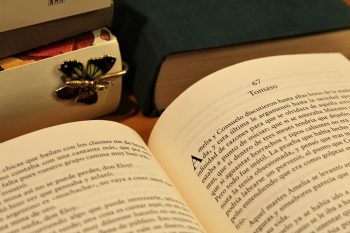Literature in Spanish: Why It is a Must for All Readers Posted by Anais on Nov 18, 2019 in Spanish Culture
It would be easy to suggest to any person with a knack for literature to read any novel coming from the Spanish-speaking world, considering just how many authors in that language have been awarded internationally—11 out of the 116 current Nobel laureates in that category, for instance.
However, there are many other reasons why literature written in Spanish is essential for every reader, from the lyric poetry in the Middle Ages to the philosophical short stories of the 20th century, all of them the most beautiful literary works ever created in any language.
A long-standing history: Literature written in Spanish spans over five centuries of rich, complex stories and fictional accounts that have been both criticizing and describing in a brand-new light the changing realities of the Western world and, later, the Americas from the seventeenth century onwards.
Miguel de Cervantes’s The Ingenious Gentleman Don Quixote of La Mancha (1605/1615) is just one of the many literary treasures of centuries past—though considered the best of them all. The anonymous picaresque novel El Lazarillo de Tormes (c. 1554), José Hernández’s epic poem Martín Fierro (1872), and Federico García Lorca’s Romancero gitano (1928) serve as powerful, intimate testimonies of their times as well.
A combative perspective: Literary works coming either from Spain or Latin America gives a major place to the social and political environment of their time, simultaneously fusing it with the peculiarities of their natural environment. The result of it all is a belligerent writing style that reveals the harshness of Western society, fights the injustices of colonialism, focuses on the struggle of Indigenous peoples, and shows the unending battle between civilization and barbarism.
As examples, there are El Inca Garcilaso de la Vega’s (1539-1616) writings, Cuban José Martí’s (1853-1895) and Nicaraguan Rubén Darío’s (1867-1916) works, and Venezuelan Rómulo Gallegos’s Doña Bárbara (1929).
A solid tradition of women writers: Women have been playing a predominant role in literature written in Spanish since before the 20th century. Starting with Sor Juana Inés de la Cruz’s (1648-1695) poetry and essays, women have left an enduring trace in every decade since: Emilia Pardo Bazán (1851-1921), Delmira Agustini (1886-1914), Teresa de la Parra (1889-1936), Nobel-winning Gabriela Mistral (1889-1957), Elena Poniatowska (1932-) Isabel Allende (1942-), Carme Riera (1948-), Rosa Montero (1951-), and countless others.
A unique literary movement: Apart from literary movements that appeared everywhere else—Romanticism, Naturalism, Realism, etc.—, two of them are exclusive to literature in Spanish: modernismo and magical realism, the latter of which brought the remarkable works of the Boom—Julio Cortázar, Gabriel García Márquez, Miguel Ángel Asturias, and Augusto Roa Bastos. Afterwards, Latin-American and Spanish writers have been venturing outside traditional narrative structures, offering an experimental, often intense narrative style that is even spiced with some humor.
Of course, well before the Boom itself there was Spanish Gaspar Melchor de Jovellanos’s El delincuente honrado (1773); Colombian Jorge Isaac’s María (1867), which is considered one of the most important novels of 19th-century Spanish American literature; Azul (1888), the key work of Modernism by Nicaraguan Rubén Darío (1867-1916); the powerful poetry of Peruvian César Vallejo (1892-1938); and the amazing fictions from Argentinean Jorge Luis Borges (1899-1986).
So, there should be no excuse to pick among the many literary names from yesterday and today to plunge yourself into a universe full of the most stunning prose and verse ever written.
Share in the comments below your favorite Spanish-speaking author or work created in Spanish.

Build vocabulary, practice pronunciation, and more with Transparent Language Online. Available anytime, anywhere, on any device.





